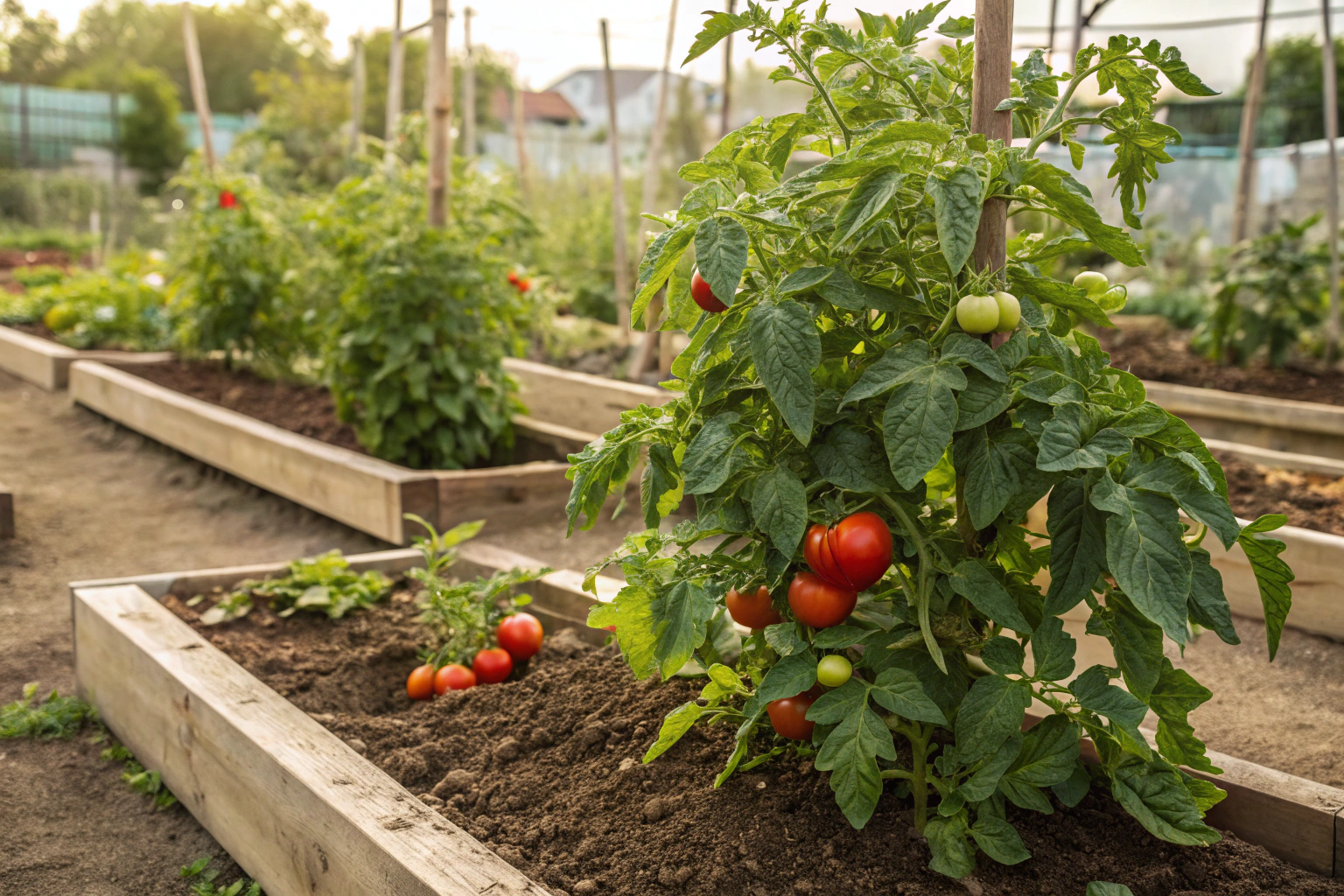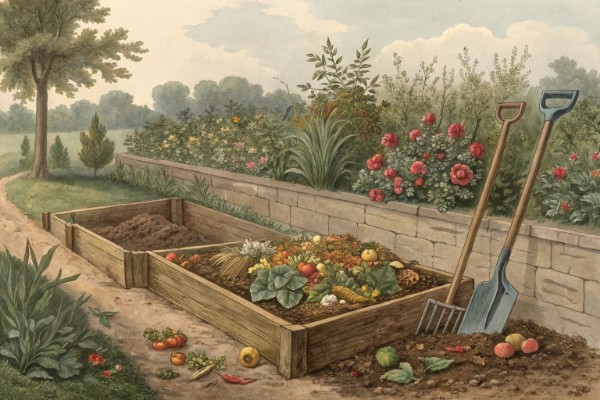Fertilizers for a Healthy, Abundant Vegetable Harvest

Fertilizers
Apply the right fertilizers and watch your veggie patch burst with abundant produce. Organic or synthetic, fast-acting or slow-release—choosing your fertilizers wisely means harvesting tastier tomatoes, crunchier carrots and leafier lettuce. Discover how the correct balance of nutrients energizes soil, feeds hungry plants, and boosts your vegetable yield season after season.
Cheatsheet: Best Practices for Vegetable Fertilizing
🌱 Soil Factors
- Test soil yearly for pH & nutrients.
- Ideal pH: 6.0-7.0 (lettuce, beans, tomatoes).
- Amend acidic soil: add lime; alkaline: add sulfur or peat.
🧪 Key Nutrients
- Nitrogen: leaf growth (spinach, lettuce).
- Phosphorus: roots & fruit (tomatoes, carrots).
- Potassium: disease resistance, flavor.
- Micronutrients: calcium, magnesium, boron (minor but vital).
🌻 Fertilizer Choices
- Organic: compost, chicken manure, fish emulsion.
- Synthetic: NPK blends (10-10-10 or 5-10-5).
- Slow-release: feeds 2-3 months; reduces runoff.
- 1 in 3 gardeners see +30% yield using compost.
🌦️ Application Timing
- Mix in base fertilizer 2 weeks before planting.
- Side-dress 4-6 weeks after sprouts emerge.
- Water after feeding for nutrient uptake.
🔄 Dosage & Method
- Never overfeed—avoid leaf burn and runoff.
- General guide: 1-2 lbs/100 sq ft (0.5-1 kg/10 m²).
- Apply granular at root zone, foliar spray for fast fix.
🪴 Tools and Products You'll Need
- Soil test kit
- Gloves & measuring scoop
- Wheelbarrow, garden fork
- Compost, granular/synthetic fertilizer
- Soft watering can
🍅 Health & Nutrition
- Organics enrich flavor, increase antioxidants (up to 20%).
- Balanced fertilization boosts vitamin A, C, and mineral content.
- Home-grown means fresher, safer, more nutrient-dense food.
🔧 Steps for Fertilizer Success
- Test soil pH and nutrients; amend as needed.
- Select fertilizer: compost for organics, NPK blend for quick boost.
- Apply base fertilizer and work 4-6 in (10-15 cm) deep before planting.
- Side-dress growing plants at mid-season.
- Water-in fertilizers to activate nutrients.
- Re-test soil annually; adjust formula for next season.
Understanding Fertilizer Types—Your Garden Feast Awaits
I remember clearly the summer I discovered how powerful the right fertilizers could actually be. My tomato plants had always done okay—but okay wasn't exactly ambitious gardening.
That summer, I experimented with various fertilizer types, digging deep (literally and figuratively) into the soil's nutritional possibilities.
Organic Fertilizers for Nutrient-Rich Harvests
If earthy aromas and tending your garden au naturel resonate with you, organic fertilizers offer real appeal. Derived from plant or animal materials, they feed not only your plants but also the soil itself.
- Compost: Homemade compost is gold—I've transformed kitchen scraps and autumn leaves into black, crumbly, nutrient-dense soil amendments. Spread this generously and watch vegetables thrive.
- Manure: Aged manure from cows, horses, or chickens breathes new life into the garden beds. Just ensure it's well-composted to avoid burning tender roots.
- Worm castings: Pure magic—I once tossed a handful beneath sluggish pepper plants, and within a few weeks, doubled their size and vigor.
"Adding organic matter such as compost or manure can increase the soil's ability to retain water by 20% or more."—Texas A&M Agricultural Extension
Synthetic Fertilizers for Specific Needs
Occasionally, a quick nutrient boost from synthetic fertilizers can save lackluster veggies. They're carefully balanced, providing exact nutrients for specific deficiencies.
- Nitrogen-heavy (N): Encourages vigorous leaf growth—for lush lettuce or kale beds. Remember though, too much promotes leaves, not fruits.
- Phosphorus-rich (P): Stimulates robust root development and flowering. My carrots loved a little extra phosphorus, rewarding me with sweet forkfuls of vibrancy.
- Potassium-packed (K): Boosts overall plant health and disease resistance—perfectly suited for tomatoes or peppers besieged with pests or stress.
Understanding Fertilizer Labels—the N-P-K Code
Ever noticed those mysterious numbers (like 10-20-10) on fertilizer packs? That's the N-P-K ratio—indicating Nitrogen, Phosphorus, and Potassium percentages.
Understanding these ratios guides precise nutrition. For abundant fruits, choose a fertilizer high in Phosphorus and Potassium (like a 5-10-10); for leafy greens, opt for higher Nitrogen (like a 12-4-8).
Liquid vs Granular Fertilizers—Choose Your Weapon Carefully
Liquid fertilizers offer rapid nutrient absorption. I love foliar feeding—particularly effective on struggling squash and cucumbers.
Granular fertilizers, slower-releasing, steadily nourish plants over time. Ideal before planting or as a seasonal top dressing, particularly useful for established perennial veggies.
"Slow-release granular fertilizer feeds your soil and crops consistently over six to eight weeks, reducing the need for frequent application."—Cornell University Extension
Feeding Schedule—The Art of Timing
I learned the hard way: timing fertilization correctly is as essential as choosing the fertilizer itself. Overfeeding or random schedules do more harm than good.
- Leafy greens: Feed every 3–4 weeks with Nitrogen-rich fertilizer during the growing season.
- Fruit-bearing veggies (tomatoes, peppers): Apply balanced fertilizers at planting, again upon flowering, and lightly during fruit set.
- Root veggies (carrots, beets): Moderate feedings with phosphorus-rich fertilizer at planting and midway through growth cycle encourage robust taproots.
Always water thoroughly after fertilization to help nutrients penetrate deeply into the soil, ensuring maximum absorption by your plants' roots.
The Beauty of Soil Testing—Know Before You Sow
The most successful gardeners I've met are soil-test evangelists, myself included. A simple testing kit reveals nutrient deficiencies and pH imbalances hidden underground.
By tailoring fertilizer applications based on actual soil conditions, I've managed harvests overflowing with flavor, consistency, and abundance.
Frequently Asked Questions About Fertilizers for Vegetable Gardens
How often should vegetables be fertilized for optimal growth?
The ideal fertilizing schedule varies by plant type and soil conditions, but most vegetables thrive when fertilized every 4 to 6 weeks during the growing season. Always follow specific recommendations provided on individual fertilizer labels for best results.
What nutrients do vegetable plants require most throughout their growing period?
Vegetable plants primarily depend on three essential nutrients: nitrogen (N), phosphorus (P), and potassium (K). Nitrogen promotes vigorous foliage growth, phosphorus supports strong root and fruit development, while potassium aids overall plant health and disease resistance.
Can fertilizers harm vegetable plants if overused?
Overfertilizing vegetables can result in burnt roots, reduced harvest, and weak growth. Always follow label directions carefully and observe vegetable plants closely for signs of stress or nutrient burn, such as leaf yellowing or curling at leaf edges.
What is the difference between organic and synthetic fertilizers for vegetables?
Organic fertilizers derive from natural plant or animal sources, offering nutrients released slowly over time and improving soil vitality. Synthetic fertilizers, made from chemical formulations, supply nutrients swiftly but risk nutrient runoff if improperly used. Consider your gardening goals and vegetable varieties when selecting either option.
Are homemade compost and fertilizers sufficient for vegetable gardening?
Homemade compost enriches soil structure and provides essential micronutrients beneficial to vegetable plants. However, certain fast-growing vegetables or nutrient-intensive varieties may require supplemental fertilizers to ensure ample nutrient availability throughout their growth cycle.
Should fertilizer applications change during different vegetable growth stages?
Adjust fertilizer application to match growth stages—for example, young seedlings typically require balanced formulations promoting root growth, while flowering and fruiting stages benefit from fertilizers higher in phosphorus and potassium to encourage productive harvests.
How does seasonal weather impact vegetable fertilizing schedules?
During cooler spring months, lower soil temperatures (below 60°F or 15.5°C) slow nutrient availability, requiring a delayed fertilizer application schedule. Conversely, warmer summer conditions (70°F–85°F or 21°C–29°C) may accelerate nutrient uptake, demanding more frequent or adjusted fertilizing to sustain vigorous vegetable growth.
Fertilizers shape the story of your vegetable patch. Get the mix right, and you’ll see lush leaves, sturdy stems, and baskets of produce. Skimp or overdo it, and you’ll be left scratching your head over stubborn tomatoes or brown leaves. Listen to your soil—test it, feed it with purpose, and keep an eye on plant signals. From classic compost to new ideas like nano-fertilizers, there’s no magic bullet, but there is a rhythm to soil life that rewards patience and attention. Feed your patch right and you’re not just growing food; you’re building a living system under your boots. There’s satisfaction in seeing your care turn into meals you pull from the dirt—real proof that the right fertilizers matter.
The Prepper’s Practical Guide to Fertilizer Self-Sufficiency
Create Nutrient-Rich Compost Teas
Steep compost in water (5:1 ratio water to compost) for 24–36 hours; stir occasionally. Apply diluted tea (1:10 tea to water) weekly for rapid, easily absorbed nutrients and beneficial microbes.
Ashes for Potassium and Calcium
- Wood Ash: Adds potassium, calcium—essential for hardy, pest-resistant vegetables. Spread 1 lb (0.45 kg) per 100 sq ft (9.3 sq m) annually. Avoid using ash from treated or painted wood.
- Eggshell Powder: Bake shells at 200°F (93°C) for 20 min. Crush finely. Sprinkle around brassicas, tomatoes—prevents blossom-end rot, boosts calcium.
Bone Meal Substitute from Kitchen Waste
Boil cleaned poultry bones for 8–12 hours. Dry thoroughly; grind finely. Apply sparingly (1 tbsp per plant) at planting for phosphorus-rich root growth.
Cover Crops: Fertilizer You Can Grow
- Legumes (peas, beans, clover): Fix nitrogen directly from air. Turn under at flowering stage for slow-release nitrogen.
- Buckwheat: Rapid growth suppresses weeds, improves soil tilth. Mow and incorporate after bloom.
Human Urine: Uncommon Yet Potent Fertilizer
Dilute fresh urine (1:10 urine to water). Provides balanced nitrogen, phosphorus, potassium. Apply carefully, avoid direct foliage contact, use once weekly.
Storing Fertilizer Ingredients for Preparedness
- Dry compost thoroughly, store in airtight containers away from moisture.
- Store wood ashes in metal containers; prevents reaction, maintains nutrient quality.
- Freeze-dried bone meal alternative stores indefinitely in vacuum-sealed jars.
Find out which plants will thrive in your garden!
Answer a few fun questions and get custom plant recommendations perfect for your space. Let’s grow something amazing together!

start your season






